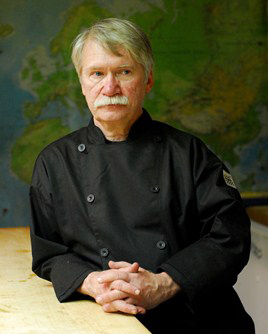Think Tank: What Will Culinary Education Look Like in 2025?
15 January 2015
 What can we learn from Detroit automakers, BlackBerry and Blockbuster? Technology and other factors are gradually changing how we cook, what we cook, how it is served and to which audience it appeals. Culinary programs need to begin planning today to meet the future needs and demands of an evolving marketplace.
What can we learn from Detroit automakers, BlackBerry and Blockbuster? Technology and other factors are gradually changing how we cook, what we cook, how it is served and to which audience it appeals. Culinary programs need to begin planning today to meet the future needs and demands of an evolving marketplace.
By Paul Sorgule, MS, AAC
It might seem odd to be thinking about an educational model 10 years from now, yet most successful businesses build strategies based on what they know and what they don’t know about the future. As deans and directors, are you asking the right questions? Are you spending enough time thinking about tomorrow while still dealing with the challenges of today?
Who should be involved in these discussions? Thoughts about tomorrow should (must) include all stakeholders in the educational process, and even those businesses and individuals who may offer insight through totally different disciplines. The stakeholders would certainly include faculty, employers, students and leaders from other institutions of higher learning, but should not be limited to this cadre of people who are directly impacted by your planning.
Look to the examples of laggards who chose to ignore the future: BlackBerry, at one point, dominated the handheld-device market. Now it is struggling to stay alive at some level. Detroit automakers were living the good life for two generations; now they are challenged by companies that listened to customers, anticipating their future needs. The recording industry was caught off guard by the advent of compressed digital formats and the ability to download music, and a once-booming industry for Blockbuster movie rentals took a back seat to Netflix and digital video downloads.
Now, you might feel that these businesses are not related to education. I would disagree. They are exactly what we must all consider when planning for the future.
What will education look like in 10 years? Consider these realities:
- The accelerating cost of a degree and difficulty in finding sufficient financial aid will drive more and more students away from formal education or to severe debt.
- Although it is still clear that in the long run the majority of students benefit financially from earning a degree, it is the need for immediate return on investment that is paramount to educational investment today.
- The cost of delivering on-ground education, including housing, student services, kitchen space, lower-than-normal student-to-faculty ratios, and supplies continues to escalate.
- The need for retraining, and training upgrades for those who have been working in the industry, has not yet been met with a college institutional formula for success.
- Advances in technology are gradually changing how we cook, what we cook, how it is served and which audience is likely to purchase it. Schools need not simply respond to this—they need to anticipate what will come and modify curriculum to build the need.
- Although education and training might differ, there is a need for both. Most food companies are ill prepared to address these needs internally. This is a missed opportunity for many college programs.
Are you scheduling sufficient time during the academic year to stimulate conversation about these realities and begin to look at what education can and should look like in 10 years? What can we learn from Detroit, Blackberry and Blockbuster? Where is the next “game changer” concept for education?
Will you become a part of the change team, or are you content to play the role of the laggard and hope for the best? How will your program brand evolve, and what needs to be in place for this evolution to work effectively?
These are exciting times for those of us in culinary education. One thing is certain: The model will look different in 2025. What is not certain is how many programs will survive and thrive as the changes occur. We might very well be at the top of that business life-cycle bell curve. Failure to bring a fresh perspective to how we view education and training will point many programs toward a future of decline.
Here are some thoughts to consider:
1. How valid is it to consider online delivery of all or part of a culinary program?
2. Understanding the application of science to food preparation is intriguing to many. Should this become a critical part of any future curriculum?
3. Is a degree really necessary, or should programs revolve around a series of mini-content certifications?
4. Is real “lifelong learning” a possibility? If so, what does it look like?
5. How do we create authentic environments for students to learn in? Is the internship model the answer? If not, what could take its place?
6. Can we learn anything from Edwards Deming in the design of future education models? His theory that successful businesses must learn to increase quality and lower price at the same time has worked elsewhere. Can it work in education?
7. Is the idea of a textbook antiquated? What will take its place?
Don’t delay; start those conversations now. As educators, we should take part in building a better future.
Paul Sorgule, MS, AAC, president of Harvest America Ventures, a “mobile restaurant incubator” based in Saranac Lake, N.Y., is the former vice president of New England Culinary Institute and a former dean at Paul Smith’s College. Contact him at This email address is being protected from spambots. You need JavaScript enabled to view it., www.harvestamericaventures.com.
Additional Info
- CAFÉ Talks Podcast Lesson Plan: 2
